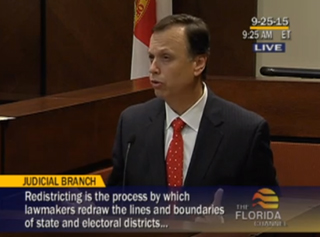|
Article
Courtesy of The Miami Herald
By Mary
Ellen Klaas
Published
September 29, 2015
TALLAHASSEE -- Sen. Tom Lee, one of the Senate’s most
powerful Republicans, took the stand Friday in the ongoing trial over
how to configure Florida’s 27 congressional districts and said that he
did not draw a district to benefit himself and he had no intention of
running for Congress.
It was a rare, personal moment in the unprecedented process that has
reshaped how redistricting works in Florida.
But, while the testimony was designed
by the Senate to undercut attacks by the Republican-led
House that the Senate map was drawn to benefit incumbent
Republicans, it also exposed how the congressional trial is
really just a practice run.
Leaders in the House and Senate have concluded that the
outcome of the trial will have a direct impact on the
drawing of something more personal than congressional
districts — the Senate map — because how the case is
resolved could decide how much input legislators will have
in shaping that plan.“A lot of
this is about precedent as we proceed with developing the
Senate maps,” said Lee, R-Brandon, after testifying on the
second day of hearings. “There are a lot of strategic
decisions that will come back based on how the court treats
the maps.” |
|
Sen. Tom Lee, R-Brandon, testifying during a hearing
Friday on the congressional redistricting map.
|
The House is arguing that its map, drawn primarily by staff in a
sequestered room with input from only lawyers hired by the GOP-led House
and Senate is more constitutional because it shielded legislators from
any improper partisan intent.
The Senate argues that the staff-drawn base map is the “starting point”
and legislators should not be penalized for changing maps — even if they
inadvertently benefit themselves — as long as there was no improper
intent.
Circuit Court Judge Terry Lewis has until Oct. 17 to recommend a
proposal to the Florida Supreme Court for the state’s final
congressional map. The hearings resume Monday.
After the Florida Supreme Court invalidated the congressional
redistricting map in July, Senate leaders conceded that the Senate map
they enacted in 2012 violated the Fair Districts provisions of the
Florida Constitution. After Lewis makes his recommendation, lawmakers
will be back in Tallahassee for a three-week special session starting
Oct. 19 to redraw the Senate map.
The House and Senate announced Friday they had reached agreement on how
to proceed with the special session, including recording all
conversations and having staff build five or six base maps. But they
must still wrestle with appeasing the needs of lawmakers with a personal
stake in the outcome.
Eight House members have opened campaigns to run for one of the 40
Senate seats on the ballot in 2016, and another 10 are rumored to be
considering it depending on how the districts are drawn.
In Broward County, for example, Rep. Gwen Clark-Reed has filed for
Senate District 31, as has former Rep. Perry Thurston, to replace
Democrat Chris Smith. In St. Petersburg, Reps. Betty Reed and Darryl
Rouson have filed for Senate District 19 to replace Democrat Sen.
Arthenia Joyner. And in Miami, Rep. Erik Fresen has filed to replace
Republican Sen. Alex Diaz de la Portilla.
A handful of senators are worried about being pitted against each other
in newly drawn districts — such as Sens. Jack Latvala, R-Clearwater, and
Jeff Brandes, R-St. Petersburg. And others are fearful of losing large
chunks from districts that they won easily.
Complicating the issue is the House leadership’s interest in using the
redistricting process to emerge as an influential player in dictating
the direction of the Senate map — allowing them to potentially influence
who gets elected to the upper chamber and, ultimately, who is elected
Senate president.
Sen. Joe Negron, R-Stuart, and Latvala are locked in a fight over who
will become Senate president after the 2016 elections. Negron says he
has pledges from 14 Republicans, a majority in the Senate, while Latvala
refuses to concede and argues that with the upended election cycle the
final vote should not occur until after Election Day.
Meawhile, Rep. Richard Corcoran, the Land O’Lakes Republican who has
been designated to be House speaker in 2016, and his closest allies
privately prefer to work with Negron.
The allegation that the Senate map was drawn for personal, partisan
benefit, is at the unspoken core of the public feud between the House
and Senate over congressional redistricting.
“You have very different interpretations with regards to the process and
rationale,” said Rep. Jose Oliva, chairman of the House Redistricting
Committee. “The Senate seems to believe they have greater latitude, and
the House has taken a more strict approach.’’
Lee testified that he prepared an amendment to keep Hillsborough County
whole because it had been a “donor” county for years to several
congressional districts.
The reconfiguration of Hillsborough, which gutted the congressional
district now held by U.S. Rep. Dennis Ross, R-Lakeland, prompted Oliva
and House leaders to reject the Senate map and dissolve the special
session in August without resolution.
The issue emerged in court Friday as Senate lawyer Raoul Cantero
attempted to show that Lee’s motives were pure. He asked Lee whether he
drew the Hillsborough configuration to benefit himself.
“No, sir,” Lee replied.
How the court decides will not only dictate how the Senate maps are
drawn, it will decide how the Fair Districts amendments are applied in
the future, Lee said.
“I realize everyone’s seeing ghosts because of what we’ve been through
over the last few years in this reapportionment process,” Lee told
reporters. “But I think it’s very important that we establish the
individual legislators’ right to impact these maps.”
|
